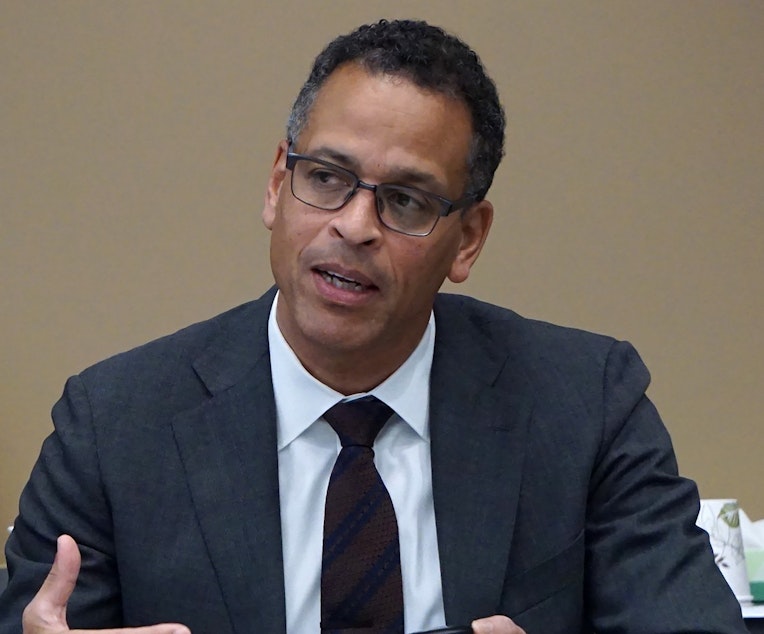This UW pediatrician has helped young people for 30 years. Now, he's on a mission to end youth incarceration

King County Executive Dow Constantine has vowed to end the practice of incarcerating youth by 2025, and now there’s an effort to end youth incarceration across the entire state.
The University of Washington School of Medicine is developing a new center with this mission in mind. Dr. Ben Danielson is a clinical professor of pediatrics at UW Medicine, and the director of Allies in Healthier Systems for Health & Abundance in Youth (AHSHAY). He told KUOW’s Kim Malcolm about his mission of ending youth incarceration from his perspective as a pediatrician.
This interview has been edited for clarity.
Dr. Ben Danielson: I think it speaks to the very heart of the reasons people like me get into pediatrics, and the essence of what it really means to be healthy, and to have the opportunity to experience health in this state. We do some things that are harmful to young people. We've done them for a long time knowing that they're harmful. I think it's time for us to actually have the will and the energy to stop doing those things that are harming the lives of young people across the state — especially young people of color.
Kim Malcolm: You’ve said that the science is unequivocal when it comes to youth incarceration. What does it tell us?
It tells us that youth incarceration does not diminish the likelihood that a youth will be finding themselves in prison later on as an adult. It tells us that youth incarceration does not offer a chance for youth to get back onto pathways that would orient them towards the success and the dreams that they have for themselves. It tells us that the resources that are expended on youth incarceration are not good investments for our society. There's really no bit of evidence that really substantiates in any particular way, the value of youth incarceration.
You mentioned youth of color. Tell us about the impact on that community.
Sponsored
For Black and Brown youth, youth detention and incarceration has been devastating for far too long across this country in cities and communities writ large. Disproportionately, Black and Brown youth have been among the rolls of youth incarceration. Even as there have been attempts to improve the experience of youth incarceration, those disparities have only deepened in the last few years.
What is your program going to do specifically to achieve this goal of ending youth incarceration?
Executive Constantine has committed to ending youth incarceration in King County by the year 2025. That means that we have a lot of work to do as a county, and I mean we. I think this is an all hands on deck kind of moment for us. We either build the infrastructure and create the resources and do the work to make that a reality, or we miss out on an important opportunity.
Some of that work includes partnering with the detention facility organization itself to decommission that center and repurpose the building and spaces with a lot of input from a lot of folks who have lived experience and a strong understanding of what's needed. It is trying to build the connections between what happens way downstream in youth incarceration, and some of the root causes that really lead to that. That can be things that happen as early as your earliest school experiences — even before that — and in every step along the way and in our communities.
For people who support the idea of ending youth incarceration for nearly all crimes, some of them may draw the line when it comes to violent crimes that can involve murder or rape. What is your response to their argument that this goes too far?
Sponsored
This is the kind of conversation that I hope work in a center like this can be deepened and amplified, and that we create spaces for this conversation to happen in a very truthful way. I hope that we can create opportunities for those who have felt the grievous harm, and for those who've been traumatized, to really be able to speak their truth and to share honestly what their expectations and fears and hopes are. I believe strongly that if we came down to the question of what is the best pathway to reduce the chance of someone in the future being the victim of a heinous crime, a deep part of that solution is ending youth incarceration. That sounds counterintuitive, but it is absolutely the truest interpretation of the information as we know it today.
You have about 30 years of experience working with children and promoting their health. As you look back on your career, does it make sense to you that this is where you find yourself now?
It makes complete sense to me. You spend a lifetime in your field, and you realize just how deep the harms of racism, indignity, and our disregard for a fellow human being can really reach. There are times when you need to move into a space that is more tangibly addressing issues like racism, and there is no greater example of how racism plays itself out and is in some ways a life-ending sentence, especially for Black people in this country, then looking at our youth incarceration system.
Listen to the interview by clicking the play button above.





